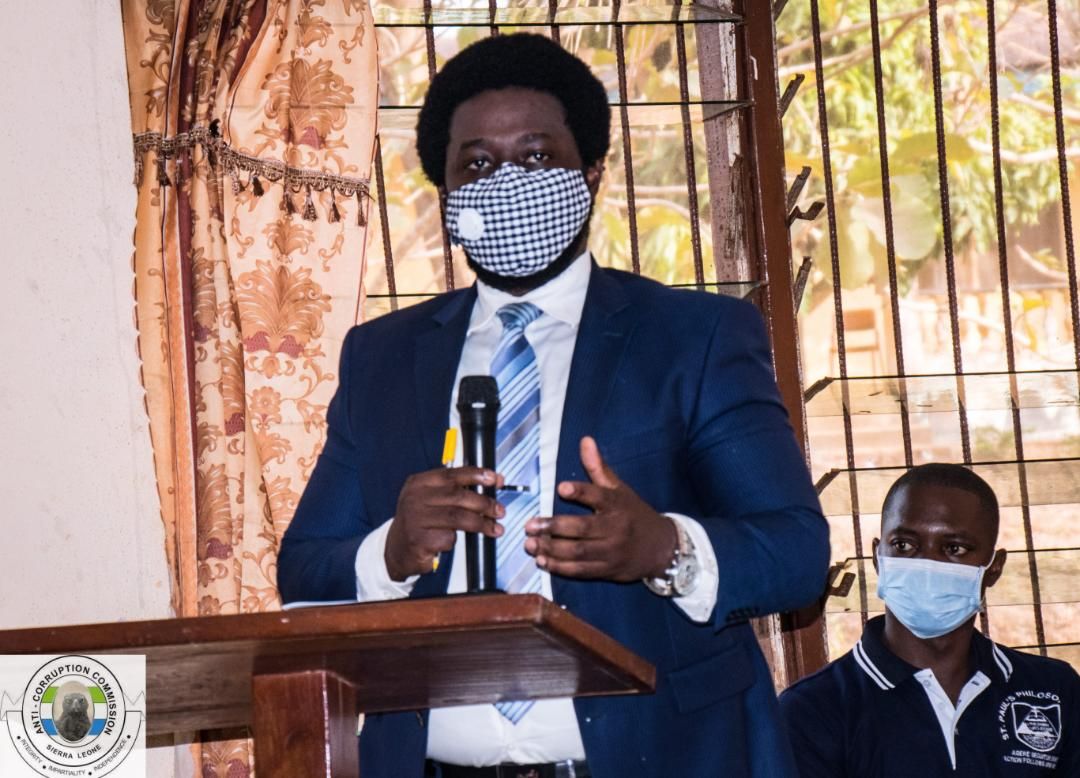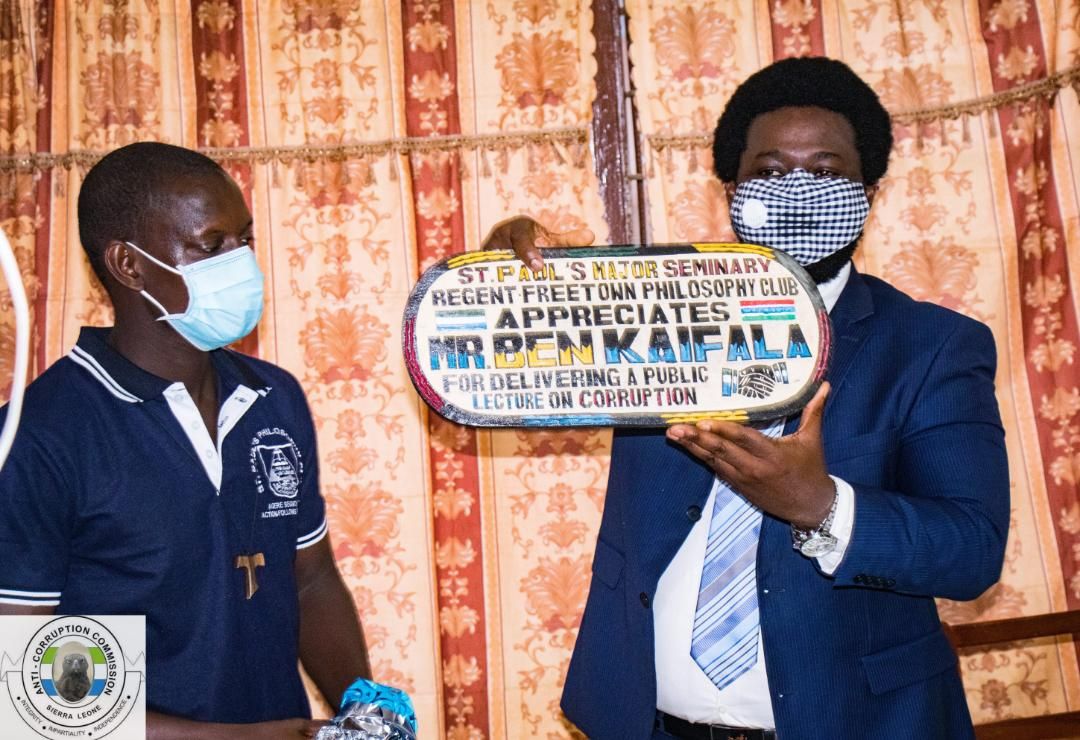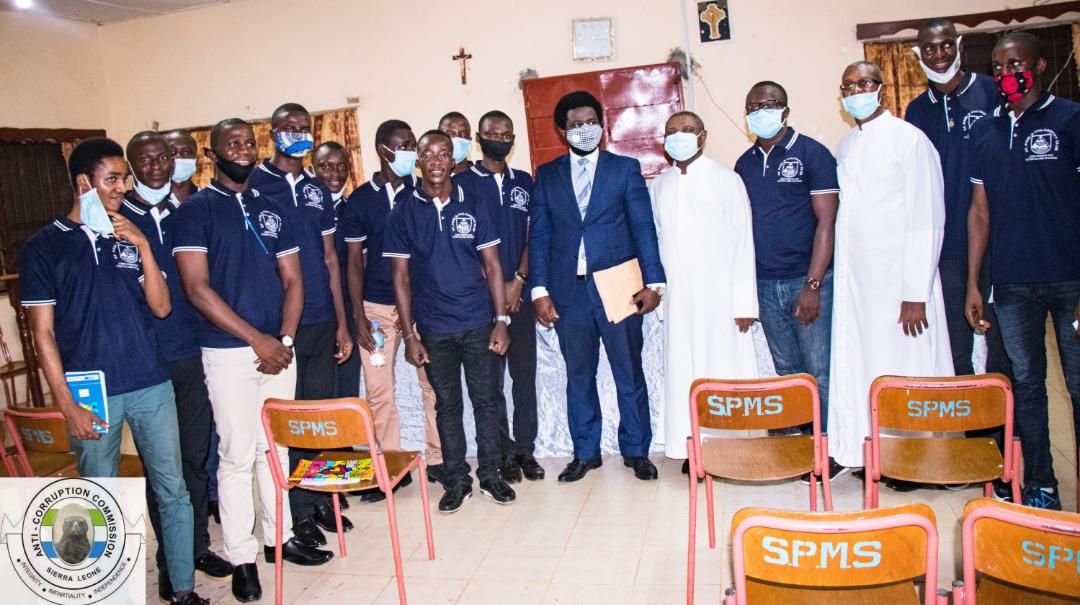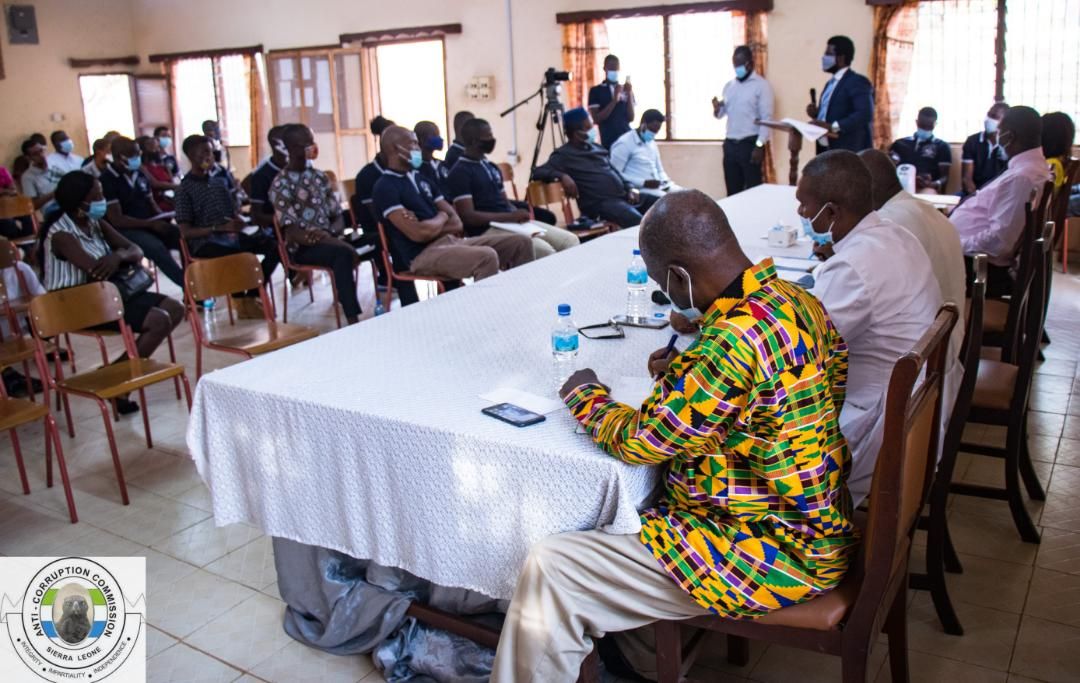PUBLIC LECTURE DELIVERED BY FRANCIS BEN KAIFALA, THE COMMISSIONER OF THE ANTI-CORRUPTION COMMISSION OF SIERRA LEONE AT THE ST. PAUL’S MAJOR SEMINARY, REGENT, FREETOWN ON WEDNESDAY, 3RD MARCH, 2021.
SALUTATIONS
1. The President Of The seminarians, the Rector, The Dean of Academics, Academic staff, Brothers of the Seminary, Members of the Philosophy Club, interested members of the public here present, Distinguished Ladies and Gentlemen.
2. I feel profoundly indebted to the Leadership for the invite to speak on the topic: “How Corruption undermines the Development of a Nation”. The country stands to immensely benefit from such discourse given the fact that as a Commission, we believe the more enlightened the citizenry are on the corrosive effects of corruption on nation-building; the more effective and efficient the fight against corruption becomes. Countries that are successful in the fight against corruption have more educated and responsive citizenry. But first, let us remember that God hates corruption, that is why he said in Proverbs 15:27 “Whoever is greedy for unjust gain troubles his own household, but he who hates bribes will live.”
3.In Hosea 9:9 it is written, “They have sunk deep into corruption, as in the days of Gibeah. God will remember their wickedness and punish them for their sins.”
4. In Isaiah 1:4 it is declared, “Woe to the sinful nation, a people whose guilt is great, a brood of evildoers, children given to corruption! They have forsaken the LORD; they have spurned the Holy One of Israel and turned their backs on him.”
5. In order to fully grasp the topic, I shall introduce you to a few corruption issues that commonly undermine effective nation-building, particularly, but no limited to Sierra leone.
CONFLICT OF INTEREST
6. Conflict of interest is a situation in which an individual has competing interests or loyalties. Conflicts of interest involve a person who has two relationships that might compete with each other for the person's loyalties.
Conflict of interest can exist in many different situations. The easiest way to explain the concept of conflict of interest is by using some examples:
• with a public official whose personal interests’ conflict with his/her professional position.
• with a person who has a position of authority in one organization that conflicts with his or her interests in another, particularly the state.
• with a person who has conflicting responsibilities.
7. Types of activities that can create a possible conflict of interest include:
- Nepotism is the practice of giving favors to relatives and close friends, often by hiring them. The term comes from the word for "nephew," it was common practice in ancient times to favour one’s nephews. Nepotism is considered a conflict of interest because the relative may not be the best person for the job.
- Self-dealing is a situation in which someone in a position of responsibility in an organization has outside conflicting interests and acts in their own interest rather than the interest of the organization. It often comes up in fiduciary situations, where someone is in a position of trust and violates that trust. An example might be a real estate agent who benefits from the sale of a property.
8. Like other types of illegal or unethical activities, conflict of interest activities, carry the risk of consequences. For example, Section 45 of the Anti-corruption Act 2008 punishes it with 5 years imprisonment minimum.
MISAPPROPRIATION
9. Another very common corruption offence is Misappropriation of Public funds; when resources meant for the benefit of the public or a section thereof is applied or redirected for personal gain or use.
ABUSE OF POSITION
10. Abuse of position is when you use your position or authority to confer undue advantage on oneself or others.
PROCUREMENT RELATED CORRUPTION
11. Corruption in public procurement takes many of the forms including bribery, embezzlement and abuse of functions. Procurement corruption may occur as a result of a conflict-of-interest situation where a public official wants to secure for him- or herself and related parties, the benefits which rightly belong to the public, by bypassing the formal requirements for the awarding of these privileges. Public procurement is particularly susceptible to corruption such as collusion to fix prices, maintenance of cartels, and other practices that thwart competition and mean that government does not receive value for money in the procurement process.
12.The magnitude of public procurement makes it a target: “both the overall amounts and individual contract amounts are huge, and they offer correspondingly large opportunities for bribes, kickbacks, and other payoffs”.
13. Transparency International has, based on a Bribe Payers Survey (Transparency International 1999), ranked sectors of the economy according to their vulnerability to corruption as follows (i) Public works contracts and construction; (ii) Arms and defense industry; (iii) Power (including petroleum and energy); (iv) Industry (including mining); (v) Healthcare/social work; (vi) Telecommunications, post (equipment and services); (vii) Civilian aerospace; (viii) Banking and finance; (ix) Agriculture. The effects of corruption in public procurement go beyond the margin: “Corruption increases the number of capital projects undertaken and tends to enlarge their size and complexity. The result is that, paradoxically, some public investment can end up reducing a country’s growth because, even though the share of public investment increases, corruption could make it not to be optimal for the public good due to practices such as over-pricing.
14. Therefore, prime target for corruption is public procurement, where corruption is most pervasive and also has more negative consequences. Corruption forms a driver for efforts to reform public procurement in numerous countries. Public procurement may account for 45% of government expenditure and up to 20% of the Gross Domestic Product for any country.
CORRUPTION OF AND POLITICAL INTERFERENCE IN OVERSIGHT AND PRICE-SETTING
15. There is a risk of regulatory authorities being affected by political or industry capture. Whenever a regulatory body submits to external pressure from other government entities or companies, it jeopardizes its independence as well as the integrity and objectivity of its decisions, and ultimately undermines its credibility as an institution. Bribery or abusively influencing the regulatory authorities undermines their functions and ultimately makes services less affordable.
BRIBERY, GIFTS AND ENTERTAINMENT
16. In Proverbs 29:4 it is said “A just king gives stability to his nation, but one who demands bribes destroys it.” Corruption, particularly bribery can be used to buy political influence, through donations to political parties and individuals in influential positions, as well as through donations to favoured charities, for example.
17. Business people recognise that companies often use improper contributions to high-ranking politicians or political parties to achieve influence.
18.The capture of state institutions and operators for political purposes is thus an extremely important issue with regard to corruption and abuse of power, be it for patronage, steering jobs to supporters or services being directed at and to geographical areas with political supporters.
CRONYISM AND NEPOTISM
19. Nepotism and cronyism are such widespread issues that are corrosively undermining the fight against corruption. It refers to situations in which public officials and decision-makers place their cronies and relatives in strategic positions in oversight and regulatory bodies, or favour companies owned by their allies and families.
THE SIERRA LEONE CORRUPTION CONUNDRUM
20. For me, Corruption is, quite simply, stealing from the poor. Generally, it is defined as “the abuse of public office for private gain.” But these forms of corruption described above are foundational and principal culprits to undermining nation-building in Sierra Leone.
21. In Sierra Leone, much of the development and significant portions of the resources allocated for public good are lost due to bribery and other related illegal and unethical activities driven mainly by Conflict of Interest and greed.
22. It is a widely held view that corruption in Sierra Leone had been widespread, systematic, and entrenched at all levels of government. We continued to lose huge percentage of our budget to corruption, especially in procurement; excluding the subsequent costs of corruption in the implementation and maintenance stages of projects.
23 Important business publications such as World Economic Forums Global Competitiveness Report had consistently pointed out that corruption hinders doing business in Sierra Leone. This reputational risk was driving away investors. The truth is, corruption is bound to flourish in a culture that encourages display of affluence without any regard as to how the wealth had been obtained. Lack of accountability plays a crucial role in the promotion of bribery and resistance to any form of reform.
24. When I became Commissioner in June 2018, I knew that the socio-economic revolution that Sierra Leone needed had to have the fight against corruption as its core. We therefore deployed rapid, but carefully planned engineering in the system to help ameliorate the situation and quickly reposition the image and respect of the country with a view to give it respectability and attract business and investment. We introduced legal radical reforms aimed at showing how serious we are about the need to effectively fight corruption. We also introduced approaches that were both commonsensical and practical within our social and political context. The returns were quick.
MEASURABLE GAINS MADE
25. Sierra leone has made incremental gains in all surveys, indexes and measurements of corruption in the last three years.
26. Sierra Leone has incrementally passed the control of corruption scorecard for three years back-to-back from 49% before President’s Bio’s assumption of office to 71% in 2018; then to 79% in 2019 and now to a Steller 81% in 2020; thereby playing a pivotal role in Sierra Leone’s selection for multi-million-dollar compact development by the Government of the United States Millennium Challenge Corporation. Before President Bio’s appointment, Sierra Leone had passed the scorecard only once and could not maintain it even the following year.
27. Sierra Leone has again progressed TWO (2) places upwards in Transparency International’s Global Corruption Ranking, moving from 119 in 2019 to 117 out of 180 countries surveyed in the 2020 Transparency International Corruption Perception Index (TI-CPI). The country also maintains its score of thirty-three (33), which is above the sub-Saharan average of 32, and the highest the country has ever recorded since the CPI rankings began. In two years, Sierra Leone has moved twelve (12) places upwards in the CPI, from 129 in 2018 to 117 in 2020. In 2017, before the election of President Bio, Sierra Leone was ranked at 130.
28.The 2020 CPI, released on Thursday, 29th January 2021, reveals that Sierra Leone continues to make remarkable progress in the world’s most respected corruption watchdog’s assessment and rankings and now leads sixty-three (63) countries in the global campaign against corruption, including 30 African countries, among which are; Guinea, Liberia, Mali, Malawi, Nigeria, Cameroon, Niger and Kenya and at par with Egypt.
29. Similar exponential jumps have been recorded in other respected global corruption measurement institutions like Afrobarometer which confirmed that corruption prevalence has massively reduced from 70% in 2015 – 2017 to a new lowest of 40% in 2020.
30.The Anti-Corruption Commission continues to pursue corruption investigations vigorously with only 6 acquittals out of 46 Judgments from 2018 to 2021 thereby ensuring a very high conviction rate.
31. Under President Bio, there has been far reaching reforms in ensuring accountability in Public Service than ever seen before. The new reforms promulgated and passed in Parliament is believed to be the strongest anti-corruption legislative reform ever in Africa.
32. The new progressive and very strong anti-corruption law increases the minimum punishment for major corruption offences to a minimum of five (5) years or a fine of not less than Le50,000,000.00 (Fifty Million Leones); strengthens protection of those who assist the Commission - witnesses, informants and whistle blowers; allows the Commission to either prosecute corrupt public officers or recover from them all monies they misappropriate plus a minimum of 10% interest and a mandatory exclusion from holding public office for not less than 3 years; allows the Commission to proceed with trial of accused persons and convict them in absentia; shifts the evidential burden for offences involving offering or receiving an advantage (bribery); and allows the Commission to appeal against sentences that are deemed lenient or disproportionate to the offence charged.
33. Additionally, The Anti-Corruption (Amendment Act), 2019 provides for administrative sanctions for Public Officers who fail to submit their Asset Declaration Forms as and within the time prescribed by the Act including withholding their salaries, suspension from public service after 3 months and removal from public service after 6 months etc.
34. Under the Non-Conviction Asset Based Asset Recovery, the Anti-Corruption Commission has recovered Le27, 000,000, 000.00 (Twenty-Seven Billion Leones) in the past three years. These total recoveries within the period of just over three years remain higher than all recoveries ever made by the ACC in its 18 years existence before the ascendency of President Bio into office.
35. The survey report titled “Actions, Hopes and Impediments in the fight against corruption in Sierra Leone”; was launched at the Commission’s 3 Gloucester Street Office in Freetown on Wednesday, 29th April 2020 shows as high as 92% confidence in the Commission and progress with the fight against corruption.
36. Successful implementation of the reform agenda would depend greatly on the support of political change agents, as well as strong legislative instruments. Although the distribution of power hegemonies, have been largely responsible for the dysfunctional nature of the Sierra Leonean political space, it is difficult to see how any meaningful change could be wrought without the cooperation of the political and higher administrative class. The probability is therefore very strong that some of the gains the reform programs in Sierra Leone have had could be attributed to the high-level leadership of the New Direction administration and the buy-in of the people.
THE WAR CRY
37. We all should know that we are in the midst of a crisis. Our nation is at war against corruption. Corruption has violently wrecked our economy; and has made Sierra Leone a reputational risk. This has effectively undermined FDI. Corruption led to war; as a consequence of greed and irresponsibility on the part of many politicians, but also our collective failure as a nation to make hard choices and prepare the country to succeed. Lives have been lost; limbs have been maimed, businesses have been shuttered; our healthcare system was failing; too many learning centers were failing; and each day brings further evidence to show that if we fail to tackle corruption; we have failed to position ourselves to join the rest of the world in the progress that the 21st century promises.
38. Nonetheless, there is a new feeling; profound levels of confidence, as evidenced in the MCC, and the recently released Afro-Barometer, that the country is turning things for the better. Today, I say to you, as a country and people, the challenges corruption poses are real. They are serious and many. They will not be met easily or in a short span of time. But know this, Sierra Leone must defeat corruption. As sons and daughters of this great land, we must be drawn together by the power of our collective hopes and not allow our fears to pull as apart; we must unite around a common purpose; and eschew the things that promotes discord amongst us.
CONCLUSION
39. 2 Peter 2:19 “They promise them freedom, but they themselves are slaves of corruption. For whatever overcomes a person, to that he is enslaved.” Our country is enslaved to corruption. It needs to be exorcised fast. You the religious leaders need to join us and make daily condemnations against corruption.
40. Corruption, a common danger in our life time, must be eliminated. With hope and virtue, let us brave the rains, the sun, and endure what storms may come, but we must fight corruption so that our grandchildren, and their children, shall know that when we were tested we refused to let this journey end, that we did not turn back nor did we falter. We shall carry forth the fight for future generations.
41. This is a watershed moment in our history. We should either get it right and prosper as a country or get it wrong and perish as a people. As a nation, our generation must take collective action against the cancer of corruption. Together, we can win. We should forget our differences and build on our uniting factors and commonality in the fight for our collective destiny. We should draw from the valour and courage of great forbearers like Sengbeh Pieh, Bai Bureh, ITA Wallace Johnson, Kai Londo, Lamina Sankoh, etc. and redirect our country’s destiny in the right direction. Now is the time to join the bandwagon of the informed and reject the chicanery of the uninformed and liberate our people from the mire of poverty mainly due to corruption! Because, if we do, as Romans 8:21 rightly says, “the creation itself will be set free from its bondage to corruption and obtain the freedom of the glory of the children of God.”
I thank you!!
FRANCIS BEN KAIFALA, ESQ








